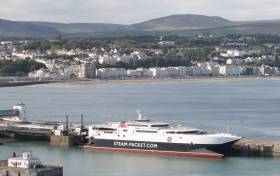Displaying items by tag: Easter Bank Holiday
Fastferry Dublin and Belfast Seasonal Services Resume to Isle of Man In Advance of Easter Break
#FerryNews - This morning the first Dublin-Isle of Man sailing for season 2018 began with fastferry Manannan departing on time at 10.45 in advance of the Easter Bank Holiday weekend, writes Jehan Ashmore.
The fast ferry service taking 2hrs 55mins is operated by the Isle of Man Steam Packet Company. Manannan made an arrival to the Irish capital having departed on the outward leg from Douglas at 07.00.
In recent days Manannan also resumed daily operated Isle of Man sailings to Liverpool and yesterday began serving through Belfast. These sailings compared to the Dublin route are marginally shorter taking 2hrs 45mins on the Ulster link.
On occasions when conventional ropax Ben-My-Chree provides these services, the sailing times are longer on both the Irish routes.
The Steam-Packet has more than 900,000 offer seats available during the season. Company Chief Executive Mark Woodward said: ‘The return of our fast craft Manannan is always an exciting and busy time for us, and we are looking forward to welcoming our passengers on board. It is always great to see a combination of Island residents heading off on their travels, along with curious visitors on their way to discover our special island!’
Manannan can take 200 vehicles and 850 passenger and crew. There are a variety of seating areas, including two cinema lounges, a large bar area at the stern and the Coast-to-Coast cafe that offers a wide selection of food options.
On the upper deck is the enlarged skylounge providing accommodation for the Niarbyl Reserved Lounge, the Manannan Premium Lounge and the Manannan Executive Club.





























































